'How could I lose everything?' Families shattered a year after LAPD fireworks explosion
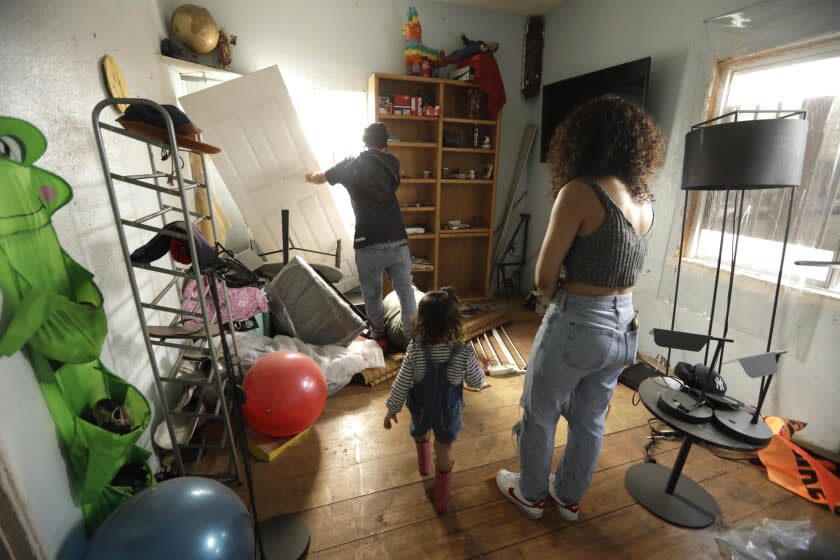
Before Los Angeles police sent a blast wave through it, Paula Benítez de Rodríguez's life revolved around the squat, bubble-gum pink building she owns in South Los Angeles.
Benítez de Rodríguez, 73, had saved for years to purchase the building, and it anchored her American dream. The apartment where she lived with her daughter Maria del Carmen Rodríguez and a grandson was there, as was her zapatería, the shoe store where she worked seven days a week.
The building also had a second apartment for another daughter, 53-year-old Leticia Rodríguez, her son-in-law, her 27-year-old grandson, her grandson's girlfriend and her great-granddaughter. There was an additional space where another daughter, Lilia, ran a hair salon that helped pay the mortgage.
The building housed four generations of her close-knit family, Benítez de Rodríguez said, and it "was everything to me."

Then, one year ago on June 30, the Los Angeles Police Department bomb squad botched the detonation of a fireworks cache discovered in the backyard of one of Benítez de Rodríguez's neighbors. The resulting blast injured 17 people and badly damaged Benítez de Rodríguez's building and many other homes. More than 80 residents of the 27th Street neighborhood were displaced.
Suddenly, Benítez de Rodríguez and her family were without their apartments and businesses. Along with dozens of other displaced residents, they moved to the luxury Level Hotel downtown — where the city rented out rooms for the families on the taxpayers' dime.
The hotel rooms were only meant to be a stopgap, a place for the families to stay until their homes near the blast site were repaired or they could find other affordable housing. But for Benítez de Rodríguez's family and more than a dozen others, that hasn't been the case.
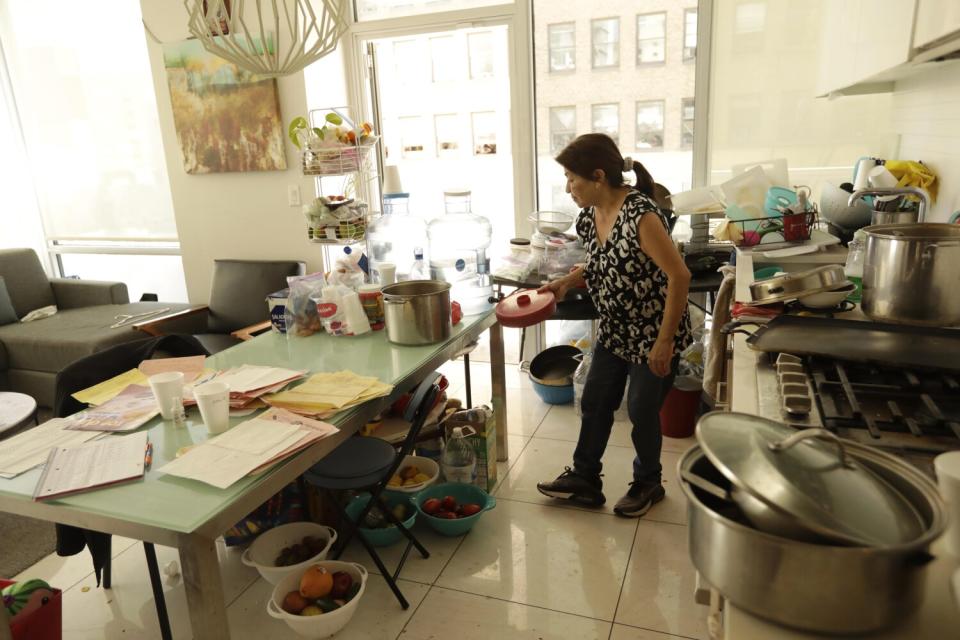
Today, 18 families — totaling 66 people — still reside at the Level, according to city officials. As of April, the city's hotel bill ran to $1.4 million. More recent invoices for the rooms have yet to be tabulated.
Asked when remaining families will be moved into more permanent housing, city officials say they don't know — though they hope it will be in the coming months.
At first a symbol of the city's efforts to assist the families, the luxury hotel has more recently come to symbolize forestalled progress — and the failure to connect those ripped from their homes with new ones.
For the families, the Level is a sort of limbo.

Benítez de Rodríguez's two-bedroom hotel suite overflows with the accoutrements of five separate lives. The fridge is crowded with food. Oranges, onions, chiles and tomatoes are stored in teal and white bowls on the kitchen floor. The women take turns cooking in the cramped space. Sometimes they stack dirty dishes out on the balcony to free up space.
"Everyone is piled on top of each other," said Benítez de Rodríguez. "From day to night, I lost everything. I lived there, had my business there. How could I lose everything?"
Obstacles to progress
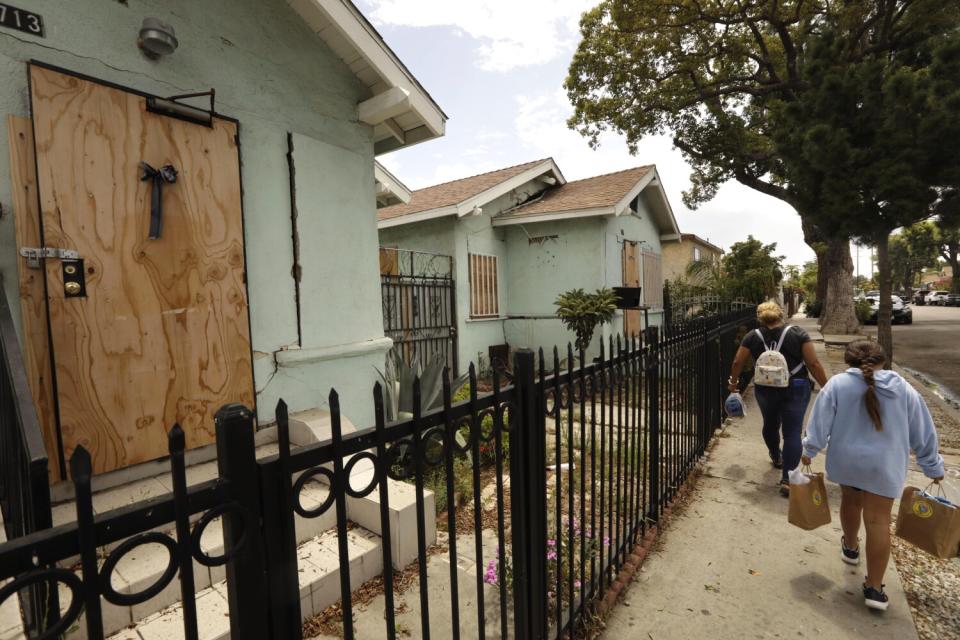
Legal claims against the city remain unresolved. At least one attorney for displaced residents has filed a lawsuit against the city. Some have told families or their landlords not to allow the city to repair their properties until they are paid substantial damages, government officials allege.
According to the city attorney's office, the city has received 408 claims relating to the fireworks blast, and resolved 137. Only two were denied. Payouts have totaled $281,316. Another 269 claims are pending.
Total costs to the city from expenses related to the blast have been estimated at about $5 million.
The illegal fireworks were found at the home of Arturo Ceja III, who pleaded guilty last year in federal court to unlicensed transport of explosives from Nevada to California. He is expected to be sentenced in the coming months.
LAPD officials say the department is holding the officers who caused the blast accountable too. But they haven't been named, and specific discipline hasn't been disclosed.
City Councilman Curren Price stood at a podium in Walker Temple AME Church — a few blocks from where the blast occurred on East 27th Street — on June 22 to announce the opening of a new resource center there for neighborhood residents.
The church center will be open five days a week in partnership with city agencies and All Peoples Community Center, Price said. Staff will provide food and other items such as diapers, as well as mental health, employment, education, transportation and immigration services, officials said.
Price said the services were not new, and have been offered by his office and others almost since the explosion occurred. But he said the center brings them all under one roof and "underscores the fact that we’re serious about not leaving until every family is served, until our community is restored."
As for the future of the families that still weren't back in the neighborhood, Price was less certain.
Six families — with 23 members — had previously been moved out of the hotel and into permanent housing. Eight households, including tenants and property owners, have declined or may still be considering relocation or repair assistance offered by the city, according to Price’s office.

"Individuals [are] receiving legal advice not to do anything, not to talk to the city, not to engage in any repairs," Price said. So "that’s what they do. But the result is the property sits there in need of repair."
It's unfair to the families whose lives were "turned upside down," Price said. "So we’re doing all we can, on a case-by-case basis."
Other officials at the event also expressed frustration — not only with lawyers and legal hurdles, but with the standard challenges of finding affordable housing in L.A. for low-income families with fixed incomes and little savings.

Abigail Marquez, general manager of the city’s Community Investment for Families Department, said many of the families were "already housing insecure" before the blast, were "living check to check, didn’t have anything saved for an emergency such as this" and were knocked to their knees with too few options.
"For many, securing other affordable housing has been unattainable, either because it's not affordable, rent costs are outside what they can sustain, they don’t qualify for Section 8," she said. Or the "housing that has been made available is too far from their work or from their children’s school. And they’re also navigating their own challenges, working with property owners who are not returning their calls, along with many, many other challenges."
Andrew Jacobson, who represents Benítez de Rodríguez, stressed that “the delay is not being caused by the lawyers.” He cited challenges working with insurance carriers to get them to agree on the scope of damages.
“We’re kind of in this quagmire, because the insurance companies have just been really delaying,” said Jacobson, who represents more than a dozen people affected by the blast. “But I believe we’re going to be in a position to make our demands hopefully in the next two weeks."
Jacobson said he’s unaware of any offers for city-paid repairs. “I don’t think any of my clients are going to want the city to be doing their repairs. They don’t really trust the city at this point,” he said.
Alder Law represents 22 people who were affected by the blast, including Jose Becerra, whose home sat in front of the "total containment vessel" in which the fireworks were detonated. The explosion caused structural damage to the family’s home and destroyed two of their cars. It shattered the house’s windows and hurled glass into Becerra's wife's face.
The Becerra family filed a lawsuit in May against the city of Los Angeles, stating that the city hadn’t fulfilled its pledge to help them rebuild.
"My clients have been struggling,” said Michael Alder, the family's attorney. "We’ve raised money for them, we’ve raised money for the entire block, just to help them survive."
To the more general allegations that lawyers have gotten in the way of repairs, Alder denied that was the case with the Becerra family.
"I have not gotten in the way at all. In fact, I’ve done the opposite," Alder said. "I’ve pled with [the city] to do something."
'Your own pillows'
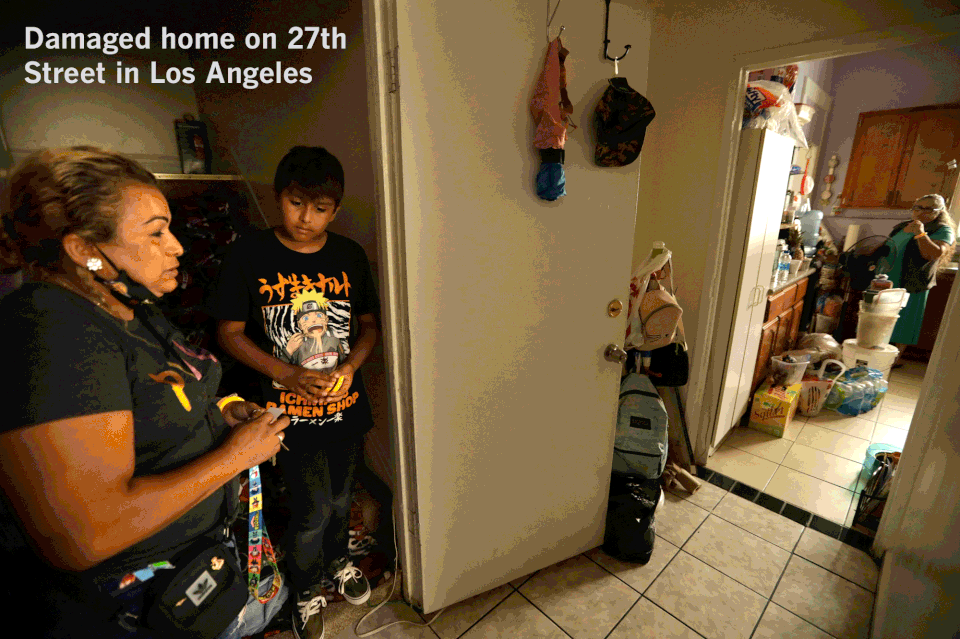
Like Benítez de Rodríguez, Hilario Velasquez has long been invested in the neighborhood.
Velasquez purchased a three-unit building on the block in 1994, after living there for nine years prior. He and his wife lived in one unit. His daughter Maria Velasquez rented another unit from him. Another daughter rented the third. They were happy.
"We would never have wanted to move from here," he said. But the blast left them no choice.
With the building damaged, the family moved to the Level Hotel, into a two-bedroom suite where they've been ever since.
Hilario and his wife stay in one bedroom, while Maria and her 16-year-old daughter live in the other. One floor above, his other daughter lives in another room with her husband and their daughter.
Maria Velasquez said the last time she lived with her parents was 15 years ago. They all have less privacy and little hope that will change soon.
Her daughter, she said, is convinced the family will still be there a couple of years from now and that she will head to the prom from their hotel room.
After the blast, the family got an attorney, who told them not to speak with Price’s office or the city, she said. The lawyer didn’t communicate with their insurance company, she said, something that she believes stalled repairs.
"The first lawyer we had, she screwed us over big time," Velasquez said.
Now the family has a new lawyer, and progress has been made in inspecting the property. Still, they’ve been told that once work starts on the house, it could take another 18 months before they can return home — which they're desperate to do.

The hotel is nice, she said, but not a home.
"People say, 'Oh, you guys are lucky, you guys have a pool, you guys have this, you have that,'" she said. "Just build the house and let me go back to my house. … I don’t care if I don’t have a pool, a gym, a sauna, a steam room. I don’t care about any of that.
"There’s nothing like having your own mattress, your own pillows," she said. "All of our life is at home."
Her father agreed, and scoffed at the idea that he was waiting on some massive payout or purposefully forestalling their return home. All he wants is for the city to make him and his family whole again, he said.
"People say we're fighting for millions, but we're not," he said. "We're fighting to go back home."
'The cage is made of gold'
Benítez de Rodríguez, too, has struggled with being away from the neighborhood.
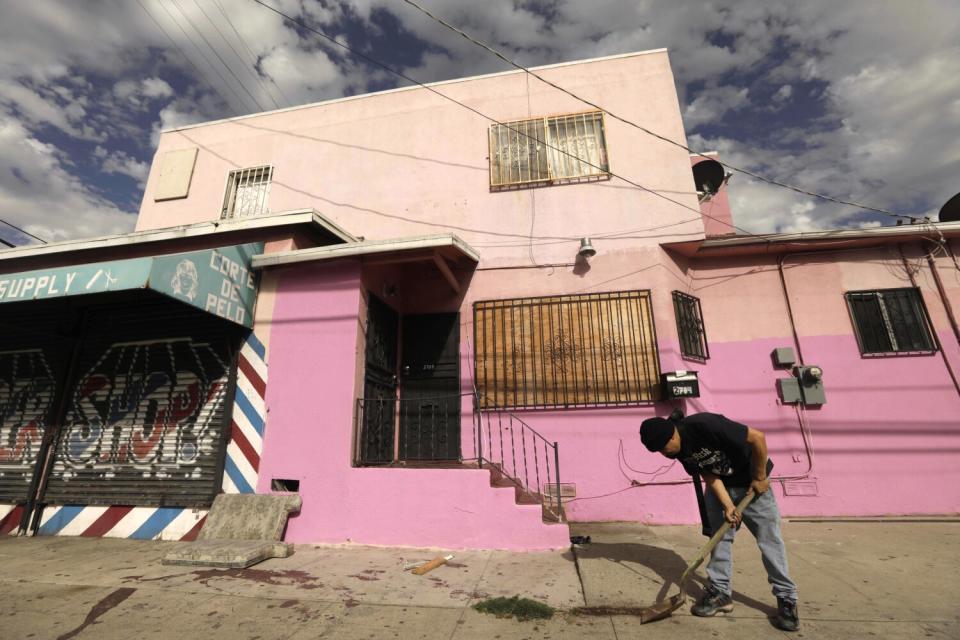
She's waiting on repairs, but doesn't have a timeline and hasn't been told when her family might be able to return to their apartments, to their businesses, to their lives.
Benítez de Rodríguez goes about her days now under a strange, juxtaposed life — living in a hotel full of beautiful amenities, and feeling trapped there.
“Aunque la jaula sea de oro, no deja de ser prisión,” Benítez de Rodríguez said, quoting a Los Tigres del Norte song.
"Although the cage is made of gold, it is still a prison."

This story originally appeared in Los Angeles Times.

